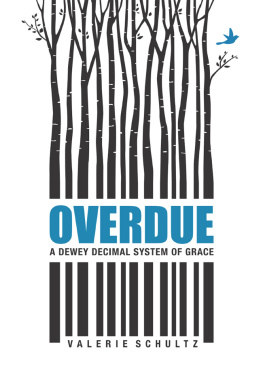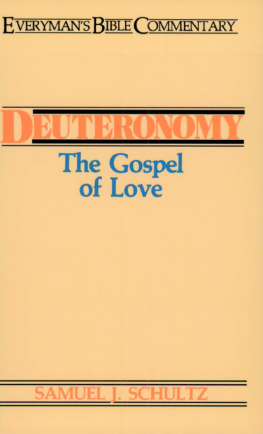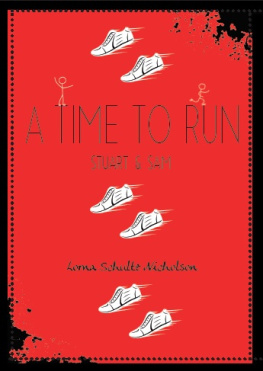Cover design by Amy Marc. Illustration courtesy of iStock by Getty Images.
Portions of some of the essays in this book previously appeared in THE BAKERSFIELD CALIFORNIAN, AMERICA, HUMAN DEVELOPMENT, LIGUORIAN, and THE LEVAN HUMANITIES REVIEW.
Names have been changed to respect privacy.
Scripture texts in this work are taken from the New American Bible, revised edition 2010, 1991, 1986, 1970 Confraternity of Christian Doctrine, Washington, D.C. and are used by permission of the copyright owner. All Rights Reserved. No part of the New American Bible may be reproduced in any form without permission in writing from the copyright owner.
2019 by Valerie Schultz
Published by Liturgical Press, Collegeville, Minnesota. All rights reserved. No part of this book may be used or reproduced in any manner whatsoever, except brief quotations in reviews, without written permission of Liturgical Press, Saint Johns Abbey, PO Box 7500, Collegeville, MN 56321-7500. Printed in the United States of America.
Library of Congress Cataloging-in-Publication Data
Names: Schultz, Valerie, author.
Title: Overdue : a Dewey decimal system of grace / Valerie Schultz.
Description: Collegeville : Liturgical Press, 2019. | Summary: Valerie Schultz shares what she learned and the grace she received during fourteen years working inside an American prisonProvided by publisher.
Identifiers: LCCN 2019012523 (print) | ISBN 9780814664117 (pbk.)
Subjects: LCSH: Church work with prisoners. | Prison librariesMiscellanea.
Classification: LCC BV4465 .S364 2019 (print) | LCC BV4465 (ebook) | DDC 259/.5dc23
LC record available at https://lccn.loc.gov/2019012523
LC ebook record available at https://lccn.loc.gov/2019980012
For the Men of Facility D
Introduction
W hen I was in prison, you visited me. Hearing these words from the Gospel of Matthew many times while growing up, I never imagined they would one day describe me. I never imagined that I would visit a prison, much less spend time with prisoners. I lived for eighteen years in a California community that included a prison within its boundaries before I ever went inside one. Prison was dangerous. Nothing good ever happened in there.
The way I started as a volunteer facilitating Catholic Communion services was an O. Henry-like story of a mix-up of ministry meetings at the local parish. I had recently resigned from a parish position and was at loose ends spiritually. Two new ministries were starting up at the time: a St. Vincent de Paul chapter and a detention ministry group. My husband volunteered us for St. Vincent de Paul, but the same woman, Emma, was taking sign-ups for both groups. Emma mistakenly told me that my husband had signed us up for detention ministry. This kind of freaked me out, conjuring up every book and movie Id ever seen that dramatized the terror of prison.
Emma called to remind us about the detention ministry group organizational meeting, I told my husband, hesitantly, one evening.
Oh. Ohhh-kaaay, my husband said with a similar hesitation. Curiously, we didnt discuss it any further. We both went to the meeting in secret trepidation, each thinking that we were supporting our mates out-of-the-blue calling. Was it odd or was it God?
Long story short, we went inside and were blessed beyond measure. Wed expected the inmates to be scarier, like characters from central casting, but the reality was that they were just folksyoung, old, short, tall, thin, stout, bald, well-coiffed, English-speaking, Spanish-speaking, outgoing, shy, articulate, silent, funny, stern. While they were sometimes tattooed to an alarming extent, they possessed all the quirks and gifts and flaws, the nobility and the sin, that define humanity. The men we met in prison profoundly enriched our lives. They gave us much more than we gave them.
As my stint in prison developed from volunteering to working in a clerical position to running a library on a yard, I came to see the prisoners more each day as human beings, created by and beloved of God. For the most part, the men I dealt with were respectful and even considerate. Some, of course, were certifiably psychopathic; some were mean or misogynistic; some had fallen in with a gang; some were actually innocent of the crime for which theyd been convicted; some had done something stupid and regrettable; some were addicts and alcoholics. In short, they were much like the non-incarcerated population. My fourteen years inside were a time of grace and learning. It was no challenge to find God in all things in prison, because God was palpably everywhere.
I think of re-imagining our prisons as places for rehabilitationan ideal that our present criminal justice system does not meetnot only as a political struggle but as a spiritual one. Along with being disproportionately handed to people of color and people of limited monetary means, prison time is mainly punitive. Taxpayers often see no need to provide inmates with any services beyond those necessary for physical survival. Many people think that, as ugly as prison time may be, these transgressors deserve whatever they get. They should be thoroughly and satisfyingly punished: justice as retribution rather than any kind of restoration. And anyone who has ever been the victim of a crime understandably wants the perpetrator of their suffering to suffer in equal measure. I totally get that deeply human response to being hurt, and I have been there myself. I know the thirst for revenge. Compassion for the convicted is not easy to come by.
This book is not an academic study of prison issues. It is a witnessing of sorts. I do hope to prompt an engagement in some soul-searching about our criminal justice priorities and policies, about the racism and classism they perpetuate, and about revamping the system to lift our fellow sinners up to healing and wholeness.
I have organized these essays around the Dewey Decimal System of book cataloging to honor the prison library where it was my privilege to work and to partake of Gods grace in many forms. The Dewey Decimal System has been largely replaced by the Library of Congress cataloging system, but smaller collections, like those in elementary schools or prisons, still utilize Dewey. Life is rarely so well organized as Dewey, but we can dream. I also ask the reader to keep in mind a prison maxim: Todays inmate is tomorrows neighbor. This may alarm us, but its true: most inmates will be released back into the community. Most intend to fit into society. Most know that the deck is stacked against them. Most can be rehabilitated. And most will respond to a kind word or an extended hand.
We can be good neighbors to anyone the good Lord plops down next to us. We can be the face of Jesus no matter where we work or live. We can be part of the solution, which is, always and of course, love.
000 Information & General Works
Heres the Deal
T he first time I walked into the library that would be my home away from home for the next five years, I noticed the windows. Soaring up to the high ceiling, the bank of windows at the south end of the unexpectedly large and spacious room admitted the spring morning light in a way that made me feel like Id come home. Dust motes diffused themselves in the suns rays, as I saw with surprise that the room looked much more like a library than a penal institution. Of course, that impression was countered by the rows of uncomfortable-looking orange plastic chairs flanking low, heavy, mismatched wooden tables that had been built decades ago in the Carpentry vocational shop by inmates no longer around, not to mention the cages encasing the few windows that actually opened. The room, devoid of patrons, smelled like books. More precisely, it smelled like a secondhand bookstore. I learned later that this library was unusual for a prison because it had open stacks the inmates could browse. Most prison libraries, constructed after this dinosaur of a prison, were small rooms with closed stacks; all books were behind a counter and the patrons could only choose their reading material from an inventory list. This library was unusually bookish. On the shelves that lined the walls and formed aisles down the middle of the large room, there must have been ten thousand volumes, their mysterious wisdom beckoning.












